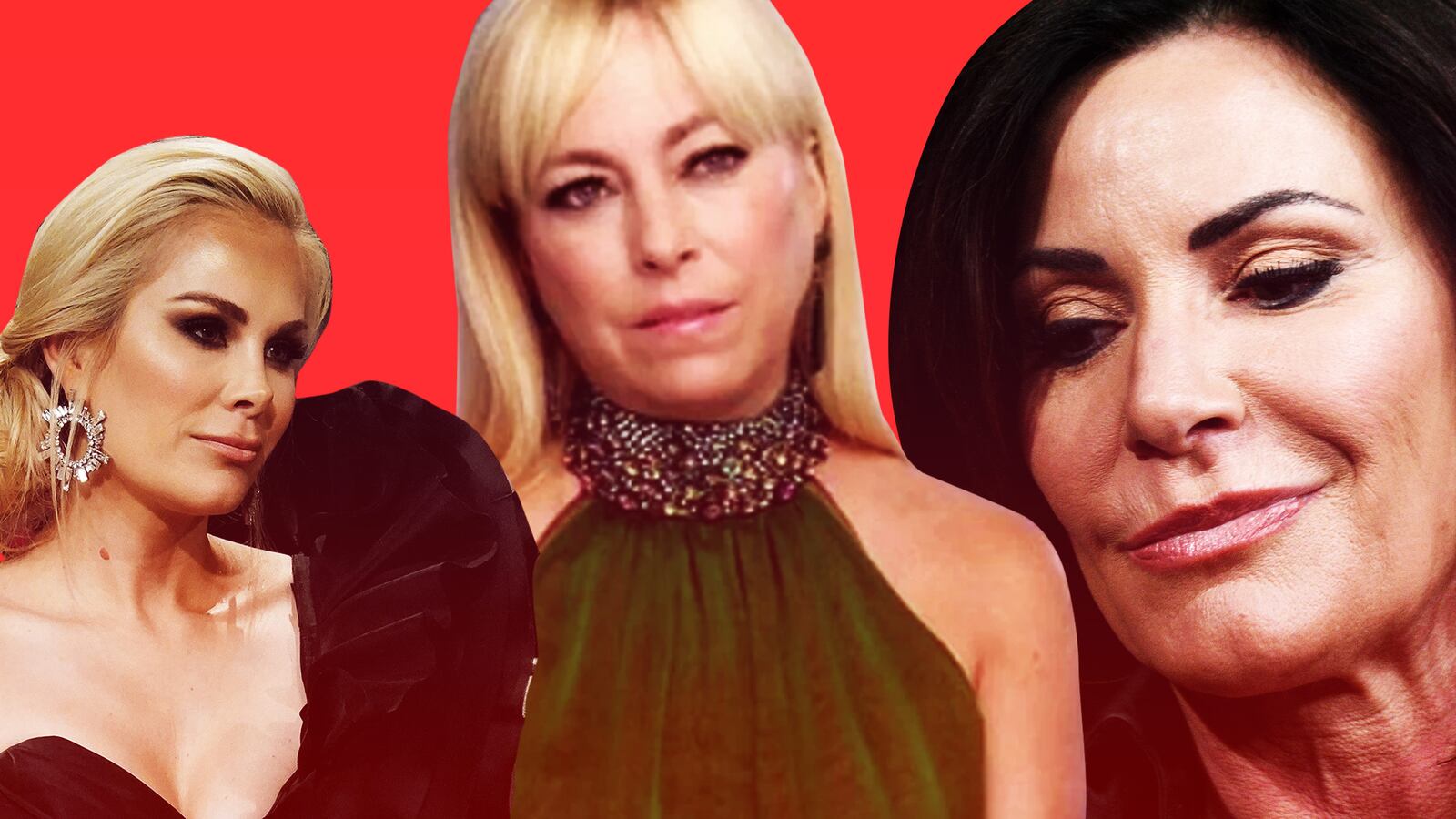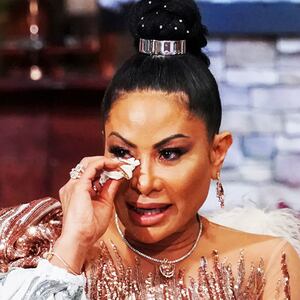Ahead of Tuesday night’s episode of Real Housewives of New York, the Bravo series’ newest cast member, Eboni K. Williams, announced in a video on Instagram that she’ll be taking a break from social media for “about two weeks” while a heated exchange between her and her castmate Luann de Lesseps, aka “the Countess,” plays out on the show.
“I’m going to take a little break, a little beat, work on my prayer, work on my situation spiritually, and I will be back,” said Williams. “When I come back in a couple of weeks after next week’s episode, I look forward to engaging with y’all as I always have and always welcome debate and conversation and discussion and connection.”
The incident that sparked conversation online came during a debate on this week’s episode about sexually explicit language after Ramona Singer expressed discomfort during a NSFW conversation led by Leah McSweeney at a previous dinner. Williams tried to explain to the women that using that type of language doesn’t mean that someone is “unclassy” or “not a lady,” to which de Lesseps replied that their differing perspectives on the matter had to do with education. When Williams, an attorney, reminded the group that she’s the most educated of the bunch, de Lesseps accused Williams of calling her uneducated and demeaning the rest of the women. When Williams tried to clarify her comment, de Lesseps continued to talk—yell, rather—over her and, at one point, said that she was an “angry woman.”
For many fans of the Real Housewives franchise who’ve watched Bravo insert women of color into their historically white casts over the past few years, this sort of clash felt inevitable. When it was announced last year that Williams would become New York’s first Black housewife in the series’ 13-season run, some fans online immediately expressed glee and excitement at the prospect of the political commentator calling out the white cast members for whatever typically classist or racist remarks they were bound to say in her presence, as she did a couple of weeks ago when Ramona referred to one of her assistants as “the help.”
Williams’ explanation of the usage of that phrase historically in the United States—and how it triggered her as the daughter of a domestic worker—surprisingly went down a lot smoother than her interaction with de Lesseps, who immediately rebuffed Williams when she informed her that she was invoking a racist and misogynistic stereotype by repeatedly calling her “angry.” However, the dynamics among the franchise’s non-white castmates and their racially dubious white peers, and the respective fallouts on social media so far, have proven more difficult to digest than fans may have originally hoped for regarding their problematic but usually pardonable faves.
Bravo’s slate of identity-focused reality shows over the past 15 years have come to define the famously messy network, beginning with the inaugural Real Housewives of Orange County and expanding into series like Vanderpump Rules, Southern Charm and Below Deck—and they’ve always provided a generally self-aware, almost hate-watching experience. In a Vulture feature published in April called ‘The Soul of Bravo,” in which writer Anna Peele examines the network’s growing conscience in the wake of Trump and the Black Lives Matter movement, she mentions what the network’s mascot Andy Cohen calls “the Bravo wink”—a way of editing that signals the absurdity or incorrectness of a comment or action made by a cast member to the audience. Like clockwork, conversations about whatever offensive remark a housewife utters or culturally insensitive costume one of them dons is typically hashed out online and might even make it on one of Cohen’s cue cards at the reunion if it gets enough buzz.
But it’s easier to execute “the Bravo wink” while maintaining the playfulness of a Real Housewives show when there’s no one to address that behavior on-screen. Since women of color like Williams, Garcelle Beauvais and Crystal Kung Minkoff on Beverly Hills, and Tiffany Moon on Dallas have been brought on in an attempt to end the franchise’s primarily racially-segregated past, the problematic behavior from white housewives that viewers are used to either laughing off or being briefly distraught over complicates their non-white castmates’ roles on these shows, and creates unrealistic expectations to rebuke and educate without shifting the core chemistry of the group.
This dilemma came to the forefront most prominently with Moon, who’s been dealing with harassment on social media from her castmate Kam Westcott and her family after she accused Westcott of making a racist comment about a Chinese dish she served at a dinner party and compared her to a Thai sex worker on Watch What Happens Live. Bravo gave a statement in support of Moon after receiving scrutiny from viewers that the network and Andy Cohen had been lax about her treatment on and outside of the show. Moon also spent her first season dealing with a video that resurfaced of her other castmate Brandi Redmond mocking Asian people—first educating her on why it was offensive, and then dealing with her white guilt and paranoia when she refused to move on from their conversation.
Likewise, Real Housewives of Beverly Hills is also experiencing a racial reckoning at the expense of its first Chinese American cast member, Crystal Kung Minkoff. At the same time de Lesseps attacked Williams on RHONY, freshman housewife Sutton Stracke went after Kung Minkoff on Real Housewives of Beverly Hills after she attempted to give her perspective on an issue between Kyle Richards and Garcelle Beauvais involving racial stereotypes. When Minkoff started talking about her experiences as an Asian woman, Stracke interrupted her, saying that stereotypes affect Southern white people, too. After Kung Minkoff asked if she was the type of person who claimed they “don’t see color,” Stracke started crying and compared accusations of racism to COVID-19. The two have since smoothed out their issues on Instagram. But as any faithful viewer of Real Housewives knows, disputes playing out on television and with social media chiming in are rarely ever put to bed before a reunion (and sometimes even after that).
As far as Williams’ situation goes, we’ll have to wait and observe how de Lesseps handles their future interactions. But with Williams already receiving criticism online that she’s “ruining the fun” of the show and “making everything about race,” it’s hard to see how any Black woman or woman of color could possibly win in this scenario.


